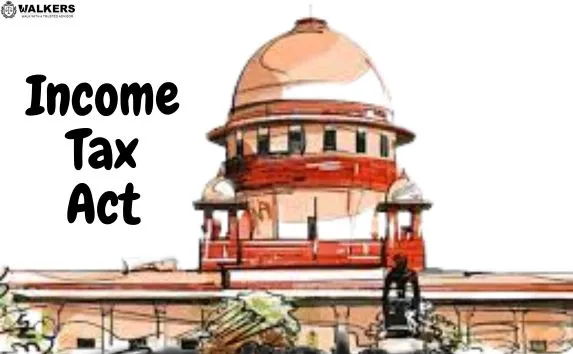


In a recent ruling, the Supreme Court has stated that taxpayers cannot claim a deduction under Section 80-IB of the Income Tax Act for profits received from the Duty Entitlement Pass Book Scheme (DEPB) and Duty Drawback Schemes. The court clarified that such profits cannot be considered as income derived from the industrial undertaking. Additionally, the court emphasized that such income is taxable as per Sections 28(iiid) and (iiie) of the Income Tax Act. The bench, comprising of Justices M.R. Shah and B.V. Nagarathna, issued this verdict.
According to the recent ruling of the Supreme Court, the DEPB and Duty Drawback Schemes are considered incentives that result from the schemes implemented by the Central Government or Section 75 of the Customs Act, 1962. The court referred to the case of Liberty India vs. Commissioner of Income Tax (2009) 9 SCC 328, where it was held that such incentive profits do not qualify as profits derived from eligible business under Section 80-IB. Rather, they fall under the category of ancillary profits of the respective undertakings. The Apex Court reiterated this view in the current case, with Justices M.R. Shah and B.V. Nagarathna presiding over the bench.
The Rajasthan High Court's ruling was upheld by the Supreme Court, affirming that the assessee cannot claim deductions under Section 80-IB of the Income Tax Act. This section allows deductions for profits and gains from specific industrial undertakings other than infrastructure development undertakings.
In line with Sections 28(iiid) and (iiie) of the Income Tax Act, any profits resulting from the transfer of Duty Drawback and DEPB Schemes will be subject to income tax under the head "Profits and gains of business or profession." This clarification by the Apex Court reiterates the tax liability on such incentive profits. The bench of Justices M.R. Shah and B.V. Nagarathna issued this verdict.
M/s. Saraf Exports, a partnership firm engaged in manufacturing and exporting wooden handicraft items, claimed deductions under Section 80-IB of the Income Tax Act for the profit/amount received under the Duty Drawback Scheme and Duty Entitlement Pass Book Scheme (DEPB) in its income tax return. However, the Deputy Commissioner disallowed the deductions, and the same was challenged by the assessee before the ITAT. The ITAT allowed the deductions, but the revenue department appealed to the Rajasthan High Court, which restored the order passed by the Deputy Commissioner.
The case was then taken up by the Supreme Court, where the assessee argued that the expression "Profit or gains derived from any business" under Section 80-IB should include any reimbursement of cost, even if the immediate source of reimbursement is the Government or its policy.
However, the revenue department contended that the income received from the DEPB and Duty Drawback Schemes is not eligible for deduction under Section 80-IB. The department argued that this income cannot be classified as "profits and gains of business or profession" and does not fall under the scope of Section 80-IB as income "derived from" an industrial undertaking. The bench of Justices M.R. Shah and B.V. Nagarathna presided over the case and ultimately upheld the decision of the Rajasthan High Court, disallowing the deductions claimed under Section 80-IB by the assessee.
The Supreme Court emphasized that in order to claim deductions under Section 80-IB, it is essential to prove that the deductions are being claimed on the “profits and gains derived from industrial undertakings” as mentioned in the section.
The court cited the Liberty India case (2009), in which it was held that the incentive profits earned from the DEPB / Duty Drawback Schemes are not profits “derived” from the eligible business under Section 80-IB, and that they fall under the category of ancillary profits of such undertakings.
Referring to Liberty India (2009), the bench observed, “In paragraph 43 of the above decision (Liberty India), it is observed and held that duty drawback, DEPB benefits, rebates, etc. cannot be credited against the cost of manufacture of goods debited in the profit and loss account for purposes of Sections 80-IA/80-IB as such remissions (credits) would constitute an independent source of income beyond the first degree nexus between profits and the industrial undertaking. Thus, it is observed and held that duty drawback receipts / DEPB benefits do not form part of the net profits of eligible industrial undertakings for the purpose of Section 80-IB of the Act, 1961.”
Therefore, the court affirmed the Rajasthan High Court’s decision, which denied the assessee’s claim for deductions under Section 80-IB. The profits earned from the DEPB and Duty Drawback Schemes cannot be considered as income “derived from” industrial undertakings, and are taxable under the head “Profits and gains of business or profession” as per Sections 28(iiid) and (iiie) of the Income Tax Act.
The Supreme Court upheld the decision of the High Court and ruled that the assessee, M/s. Saraf Exports, was not entitled to claim deductions under Section 80-IB on the profit earned from DEPB and the Duty Drawback Schemes. The court concluded that such income cannot be considered as an income "derived from" an industrial undertaking as mentioned in Section 80-IB. The court also held that the High Court was correct in disallowing the deductions claimed by the assessee. As a result, the appeal filed by the assessee was dismissed by the court. The court further held that any decision of a High Court that contradicts its ruling is not valid.
Case Title: M/s. Saraf Exports vs. Commissioner of Income Tax, Jaipur-III
TAGS: Supreme Court Saraf Exports Section 80-IB DEPB Duty Drawback Scheme Income Tax Act Rajasthan High Court Apex Court deductions industrial undertakings.